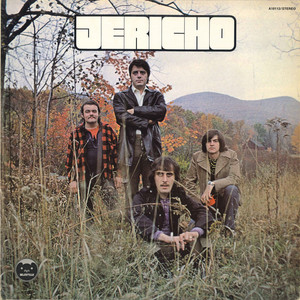Jericho
Websites:
No
Origin:
Toronto, Ontario, 🇨🇦
Biography:
Jericho was a Toronto-based rock band whose brief moment in the spotlight produced one of the great lost gems of Canadian music. Formed in early 1970, the group brought together four exceptional musicians from the heart of Canada's vibrant ’60s and early ’70s scene: guitarist and vocalist Fred Keeler, keyboardist and accordionist Gordon Fleming, bassist Denny Gerrard, and drummer Frank DiFelice. All were seasoned veterans—Keeler and Fleming had played together in The Shays, Gerrard was fresh from The Paupers and McKenna Mendelson Mainline, and DiFelice had powered the rhythm section for Grant Smith & The Power. Gerrard also recorded with Richie Havens and Peter, Paul & Mary, and was twice nominated for Playboy magazine’s Jazz Poll. Fleming, a longtime Toronto session player, had worked with Ronnie Hawkins, John Hammond, Jesse Winchester, and Cat Stevens—and studied music at the University of Toronto.
Their paths converged under the guidance of manager Chuck Beal, also a former Paupers member, who assembled the lineup with the ambition of forging a band that could match the soul and musicianship of The Band while carving out its own, harder-edged identity.
That ambition took them to Bearsville Studios in Woodstock, New York, the newly minted studio built by Bob Dylan’s manager Albert Grossman. At the helm was Todd Rundgren—fresh off engineering and producing The Band’s Stage Fright—who produced and engineered the Jericho sessions and also contributed rhythm guitar and harmonies. The album layout was designed by Bob Cato, whose work on Stage Fright created a strong visual kinship between the two releases. The band was even granted access to Garth Hudson’s Leslie speaker and Clavinet, tools that Fleming would use to thrilling effect.
Released in 1971 on Bearsville Records and distributed by Ampex, Jericho captured an explosive mix of roots rock, swampy funk, country-soul, and gospel-tinted blues, delivered with conviction and remarkable musicianship. They bust down the door with “True Fine Girl,” sounding like The Band on steroids, driven by overdriven organ and searing guitar leads. “SS #4” carries a similar charge—imagine “Cripple Creek” with a hard rock snarl. The album doesn't just rock—it grooves. “Cheater Man” explodes with gnarly clavinet runs and rhythmic left-turns that flirt with progressive rock. “Backtrack” is a wild Edgar Winter-style instrumental, played through Hudson’s gear, that pushes the band into another stratosphere.
Jericho also knew how to pull back. “Baby’s Gone Again” is a blues shuffle that hits harder than Cream. “Goin’ To The Country” is a goofy, stoned groove that swaps jug-band pluck for wowy Moog bass, giving the album a moment of pure rustic weirdness. The vocals on that track shine—though in truth, the singing is excellent throughout, a soulful complement to the band’s rough-hewn polish. A cover of Mose Allison’s “Fool Killer” adds a cerebral blues edge, while “Can’t Seem to Make It Happen” delivers a jaw-dropping finish, hailed by radio DJ Bill Munson as a track that “still takes my breath away after 25 years.”
The lone single, “Make It Better,” reached #80 on the RPM Canadian charts in July 1971, but the album—undeniably well-played, well-produced, and genre-blending—went largely unheard outside of collectors’ circles. It was never reissued on LP or CD until decades later, despite strong critical reassessments from fans and reissue labels. In a perfect world, classic rock gems like Jericho would no longer be neglected by the airwaves. It’s exactly the kind of record assembled by demand—for something sweet-sounding, authentic-as-it-gets, and yet mysteriously overlooked.
Despite glowing reviews from those who discovered it, Jericho was ultimately a one-album wonder. Keeler, Fleming, and Gerrard all departed within months of the LP’s release. DiFelice tried to keep the name alive with a new lineup including Scott “Professor Piano” Cushnie and guitarist Danny Marks, but the group dissolved before recording again.
Though Jericho vanished from the scene as quickly as they arrived, their album remains a buried treasure of Canadian roots rock. It’s a record that pushed a little too hard for mass appeal, but not for lack of heart or skill. With Rundgren at the board, a band of seasoned players at their peak, and a sound that veered from gospel-fueled rave-ups to clavinet-shredding deep cuts, Jericho deserved much more than it got—and still does.
-Robert Williston
Fred Keeler: lead guitar, vocals
Denny Gerrard: bass, vocals
Gord Fleming: organ, piano, vocals
Frank DiFelice: drums
Todd Rundgren: rhythm guitar, harmonies




